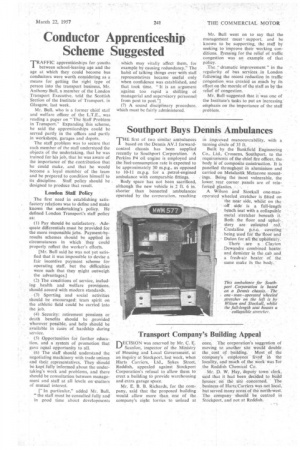Conductor Apprenticeship Scheme Suggested
Page 53

If you've noticed an error in this article please click here to report it so we can fix it.
TRAFFIC apprenticeships for -youths
between school-leaving age and the age at which they could become bus conductors were worth considering as a means for getting the right type of person into the transport business, Mr. Anthony-Bull, a member of the London Transport Executive, told the Scottish Section of the Institute of Transport, in Glasgow, last week.
Mr. Bull, who is a former chief staff and welfare officer of the L.T.E., was reading a paper on "The Staff Problem in Transport." Expanding this scheme, he said the apprenticeships could be served partly in the offices and partly in workshops, garages and depots.
The staff problem was to secure that each member of the staff understood the objects of the undertaking, that he was trained for his job, that he was aware of the importance of the contribution that he could make, and that he would become a loyal member of the team and be prepared to condition himself to its discipline. Staff policy should be _ designed to produce that result.
London Staff Policy
The first need in establishing satisfactory relations was to define and make known the undertaking's pelicy. He defined London Transport's staff policy as: (1) Pay should be satisfactory. Ade quate differentials must be provided for the more responsible jobs. Payment-by results schemes should be applied in circumstances in which they could properly reflect the worker's efforts.
[Mr. Bull said he was not yet satisfied that it was impossible to devise a fair incentive payment scheme for operating staff, but the difficulties were such that they might outweigh the advantages.] (2) The conditions of service, including health and welfare provisions, should accord with modern standards.
(3) Sporting and social activities should be encouraged: team spirit on the athletic field could be carried into the job.
(4) Security: retirement pensions or death benefits should be ,provided wherever possible, and help should be available in cases of hardship during service.
(5) Opportunities for further education, and a system of promotion that gave equal opportunity to all.
(6) The staff should understand the negotiating machinery with trade unions and their representatives. They should be kept fully informed about the undertaking's work and problems, and there should be consultation between management and staff at all levels on 'matters of mutual interest.
[" In particular," added Mr. Bull, "the staff must be consulted fully and in good time about developments which may vitally affect them, for example by causing redundancy." The habit of talking things over with staff representatives became useful only when confidence was established, and • that took time. "It is an argument against toe rapid a shifting Of managerial and supervisory personnel from post to post.-]
(7) A sound disciplinary procedure, which must be fairly administered. Mr. Bull went on to say that the management must support, and be known to be supporting, the staff by seeking to improve their working conditions. pressing for the relief of traffic congestion was an example of that policy.
The " dramatic improvement" in the regularity of bus services in London rollowing the recent reduction in traffic congestion was created as much by its effect on the morale of the staff as by the relief of congestion, Mr. Bull suggested that it was one of the Institute's tasks to put an increasing emphasis on the importance of the staff problem.




























































































